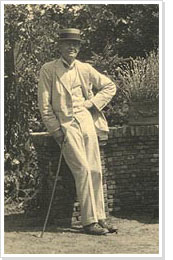Music manuscripts of Alphons Diepenbrock (1862-1921), composer > Music
 "Not to have worked in vain all those years, and feel a total failure, I must bring those of my earlier works that I think are worth preserving, technically up to the level of my current capabilities."
"Not to have worked in vain all those years, and feel a total failure, I must bring those of my earlier works that I think are worth preserving, technically up to the level of my current capabilities."
This is a statement typical of Alphons Diepenbrock, then 50 years of age, who was unable to refrain from going over his completed works time and again and to keep 'improving' them.
Diepenbrock's oeuvre is among the highlights of Dutch music history. In terms of his 'tonal language' Diepenbrock's oeuvre shares its atmosphere with that of composers such as Strauss, Mahler as well as with Debussy's earlier works.
Most of Diepenbrock's oeuvre consists of vocal works. In almost every composition he included the human voice, which was unusual at the time. For Diepenbrock, music emanated from words. He aimed for the complete coinciding of the sound of the word as it was spoken and sung. Diepenbrock used the term 'tempo per vocali' to indicate that the rhythm of his vocal music was determined by the spoken language.
Diepenbrock was the creator of the ‘symphonic song’ (songs accompanied by orchestra) and wrote numerous songs with piano accompaniment.
